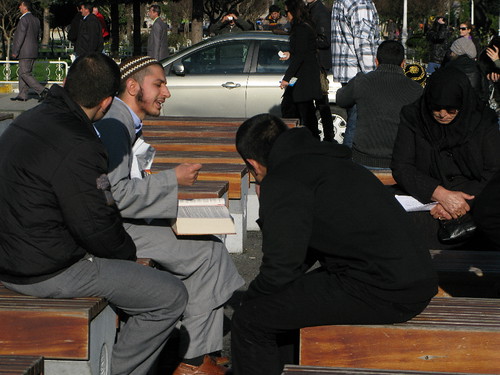

[...] The quiet winner of this battle is Daniel Zingg, 53, a balding man with wire-rimmed glasses. He's sitting in a pizzeria across from the railway station in Langenthal and speaking in a hoarse whisper. The minarets, those "spearheads of the Sharia," those "signs of territory newly conquered by Islam," can no longer be built, he says, and thus the Swiss have solved a problem that has already become seemingly intractable elsewhere, such as in the large cities of England and France. It's a well-known fact that first come the minarets, then the muezzins, with their calls to prayer, the burqas and finally Sharia law, he says. According to Zingg, the ban is not directed against Muslims, although it is naturally true that "the Koran gives (people) the mission to Islamize the world, and the Muslims here have no other mission, otherwise they would not be Muslims."
For the past 15 years, Zingg has been giving lectures in support of Israel and against Islam. He's a politician with the ultraconservative Christian party, the Federal Democratic Union, which received 1.3 percent of the vote in the last election. He has never set foot in the mosque in his town because he has heard that anyone who walks barefoot in one becomes a Muslim. Zingg doesn't want to take that risk. [...]
Some people have just bought "Syayvo" bookstore; paid approx. UAH2.7mln ($340,000) for 364sq m (UKR) http://bit.ly/7LAtOb
***
Normally, 1sq m in that area would cost you from $4,000 to $15,000. Since 1991, some 70 bookstores have been shut down in Kyiv. Суки.
[Sergei Maximishin's photo from Sevastopol]
Spent two weeks working in Ukraine - together with Stern's correspondent Tilman Müller [who was doing the writing], we were working on a large overview story about the country. Politics, economy, the army, religion, culture, sports, Euro 2012, the upcoming election, the Russian fleet, swine flu, ultra-right forces, social issues, everyday life. St. Petersburg-Moscow-Donetsk-Kyiv-Lviv-Kyiv-Donetsk-Kyiv-Sevastopol-Kyiv-St. Petersburg.
Before we started working, we met with the editor of the English-language newspaper [Kyiv Post] - and asked for advice: how to get here, and how to get there. To the question on how we should go about shooting something about the Ukrainian army, this wise man recommended not wasting energy and time - it's not going to work anyway.
Overconfident, I neglected this advice and started calling Mr. Khalyavynsky - "head of the press service of the Ministry of Defense of Ukraine." For three days, [he] wasn't there, and, asked how it was possible to get in touch with him, his secretary replied, "How would I know?" On the third day, the secretary had mercy on us and gave us his fax number. I wrote a letter in English, asking to help us with shooting on two objects: we were interested in the Ukrainian fleet based in Sevastopol and the Kyiv-based honor guard unit. Emailed the letter to Hamburg, asked to print it out, have the managers sign it and fax to Kyiv.
A day later, I called the press service again:
- Good afternoon, my name is Serhiy Maksimishin, photographer with the Stern chronicle, Germany. I'd like to ask if there's been any reaction to our fax letter.
- What fax letter? There haven't been any fax letters from Germany.
- What do you mean there haven't been any? Our newsroom said they had sent one yesterday...
- They couldn't have sent anything, because we couldn't have received anything.
- How come???
- Because we've been out of fax paper for a week already.
- Oh God, when will you get it?
- Actually, we do have it, but the person who knows how to insert it isn't here.
- And when will this person appear?
- Call us back on Monday, maybe someone will show up...
I call them Monday. Fax paper has been inserted. I call the Germans, ask them to re-send the fax and confirm via phone. The Germans call back, say that everything has been sent. I call the press service.
- Ms. Svitlana, this is Serhiy Maksimishin again, photographer with the Stern chronicle, Germany. Tell me please, have you received our fax?
- Yeah, some kind of thing has come through...
- What do you mean, "some kind of thing"???
- Oh, but it's in a foreign language, so who can read it?..
- What, not a single person in the entire press service knows English??? Aren't you ashamed?
- Well... Hold on... I'll ask...
Five minutes later:
- No, the head [of the press service] said Stern should send a letter in Ukrainian.
- May I translate it myself?
- Hold on.
Five more minutes:
- Mr. Khalyavinsky says that, as an exception, you may come over to our office and translate it here.
Tilman and I take a ride across the city to the press service. We find ruins there: the impression is that they started doing renovations some two years ago, and ran out of money a year later. First of all, Svetlana the secretary demands to see our foreign affairs ministry accreditation cards. Tilman had left his at the hotel. The secretary says no one would bother talking to him without accreditation. I say that since I do have accreditation with me, let the boss speak with me. The secretary disappears behind her boss' door. Then comes back: the boss said that if you've come together, there should be two accreditation cards - otherwise, there'll be no conversation. Tilman calls the hotel, asks the receptionist to go up to his room, find the piece of paper and fax it to us. Fifteen minutes later, the accreditation gets out of the fax machine. The secretary asks us to show her our passports. Spends a long time comparing photographs to the originals. Finally, she hands the letter faxed from Stern to me, as well as two sheets of paper, and asks me to do a written translation of the text. I ask her where I could sit down. "Right here" - she brings a chair to the construction trestle in the hallway. She doesn't offer a seat to Tilman. I begin translating. [She] glances over my shoulder and protests: "Why are you translating into the Russian language? The boss said it should be in Ukrainian!" I start over, this time in Ukrainian. Who the hell knows what "honor guard unit" is in Ukrainian. At last, I give the fax letter and the hand-written translation to the secretary, she takes it behind the door covered with black fake leather. Ten minutes later, we are allowed to proceed to Mr. Khalyavinsky's office. Judging by how well-fed [he] is, his rank must be no lower than lieutenant colonel; he doesn't get up from his desk, is hiding his feet in blue rubber slippers under the table.
In English, Tilman delivers a ritual spiel about Stern and its 8 million readers. I translate it into the nightingale language [Ukrainian]. Khalyavinsky shines with friendliness. [He] barely speaks Ukrainian, gets the words mixed up. Apologizes for this, says that he has spent his whole life as a correspondent with the [Russian/Soviet] Northern Fleet newspaper, and now he is forced to learn Ukrainian anew. Says that he'd be happy to help us, but he's surprised why such experienced journalists of such an esteemed magazine don't know the basic things and have taken the wrong path. The right path, according to Khalyavinsky, is this: "Let the Germans talk to their military attache, who has to write a letter to Mr. Miroshnichenko, head of the defense ministry's committee for international cooperation, and Mr. Miroshnichenko has to issue a resolution and address it to the minister [of defense], and then the minister would give orders to Khalyavinsky, and then there'll be no problems whatsoever, work as you please."
Tilman called the German embassy right from [Khalyavinsky's] office, they spend five minutes looking for the attache, the German spends a long time explaining "the right path" to his compatriot, then hands over the phone to Khalyavinsky, who, once again, this time in Ukrainian, describes the trajectory of paperwork. The attache promises to help. As I say good-bye, I ask Khalyavinsky for [his] cell phone number and that of Mr. Miroshnichenko, whom I'm not acquainted with - "head of the committee for international cooperation." The attache calls the next day, says that he's sent the letter out, but doubts this will bring any results. One day later, I call Khalyavinsky - he says that "unfortunately, the minister [of defense] has fallen ill" and recommends calling Miroshnichenko. Miroshnichenko's phone is turned off. I call Khalyavinsky on his cell phone again: "The number you are trying to reach is unavailable at the moment." I call Svetlana on her landline phone:
- Mr. Khalyavinsky isn't there.
- When will he be in?
- How would I know?
All this, for an entire week.
We ended up deciding to fly to Sevastopol and shoot whatever's available. At the embankment, I hired a boat for 450 hryvnias [approx. $56] and, for 100 hryvnias [$12.50], two midshipmen of the Russian Navy, who promised to show us all the Russian ships, including the fleet's flagship cruiser Moskva, which is currently laid up at a floating dock. Already on the boat, I ask the midshipmen:
- And where is the Ukrainian fleet stationed?
- Ah, it's not here, they've all gone to Bulgaria for tomatoes, - the midshipmen laugh at their own joke.
P.S. If some of you think that the Russian defense ministry's press service employs a different type of people, you are mistaken.
As one of my acquaintances used to say, "we are working from inside a tight circle of [morons]."
You shouldn't be ashamed for the country: the country and the state are different things, but alas, not everyone understands this.
[...] Mother, her daughter, and grandson, aged 5 or so. Have been living at the train station for two days. Are 400 rubles (approx. $13) short of [buying tickets] to get to their native village, not far from [Penza]. Are coming back from a funeral. Are waiting for a female relative to arrive and bring those 400 rubles. The relative isn't coming - possibly, because she is out of money, too. They asked [me] to send a text message [from my cell phone]. Ordinary village people. Maybe they aren't too clever and aren't too educated, but they are open-minded and ingenuous. Qualities of no small value nowadays. The mother's pension is 4,500 rubles [a month; approx. $148]. The daughter sometimes works in Penza, and sometimes doesn't. The son doesn't attend a kindergarten. [Because] there is no kindergarten. A female relative had died, they gathered all the money they had and set off to bury her. "How else? - One has to bid a decent human farewell..." [...]
[...] Four ethnic Tatar women commute weekly from their village to Syzran to earn some money. At best, they make a thousand [rubles; approx. $33] between the four of them, working as cleaning ladies at public facilities and anywhere else. There is no work whatsoever in the village. "There is work, but none of it pays." Sometimes they don't have enough money to simply buy bread. So they buy flour and bake their own bread. To save money. They have their own potatoes. And cucumbers, and cabbage. But they don't have money. "It's possible to survive, but very difficult. It's easier to die..." [...]
[...] A man, aged 55 or a little older. His children threw him out of his home. Just like that: "Get the hell out of here... Sometimes I stay with my acquaintances, and sometimes at the train station. Do random jobs, here and there..." Doesn't consider himself a hobo, because "there are no hobos in a small town. People do help." He's got cold tea in a plastic bottle. Bread and foul-smelling cutlets are wrapped in some piece of rag. He ate one cutlet with bread. Washed it down with tea and fell asleep on the train station bench right after that. Just lowered his head onto his chest and fell asleep. [...]
[...] You can spend a couple more hours there and write a piece. With no comments. Just by listening and writing down things that people say to each other. It's that simple. Any journalist can do this. And no damn intellectual analysis is required. [...]

The clock is an important item in the mosque. The muezzin must be punctual in announcing the call to prayer. His timepiece marks the points for Salāt, "prayer," between dawn and sunset. [...]
Minarets may now be seen as entirely characteristic of Muslim religious architecture, but the very first mosques had none. The call to prayer was customarily made from the roof of the mosque itself. Equally, while it is now widely taken for granted that the purpose of a minaret is to provide the muezzin, who gives the five daily calls to prayer, with an elevated platform from which to make them, it is not so clear that this was its original purpose. The word minaret is related to nur, the word for light, and it is possible that not only was the form of the minaret influenced by that of the ancient Pharos or Lighthouse of Alexandria, but also that many of the early minarets were not designed as places for making the call to prayer. Indeed, some were not attached to mosques at all [...]. Rather, they seem in some cases at least to have functioned as lighthouses, guiding travellers across both seas and deserts. Others served as watchtowers, and still others were put up as monuments to commemorate Muslim victories.
The earliest minaret attached to a mosque was allegedly put up at Basra in southern Iraq in the 660s, though it has not survived. Early mosques had only one minaret [...] - if any - but over the centuries there was a slow proliferation in their number. These additional minarets had a decorative rather than a functional purpose; in later centuries as minarets increased in height nad became more slender, they were to all intents and purposes useless as places from which to make the call to prayer. Since the minaret was unknown in the lifetime of the Prophet, some strict Muslims denounced (and continue to denounce) minarets as ostentatious and unnecessary innovations. [...]"
[...] At this point they came in sight of thirty or forty windmills that there are on plain, and as soon as Don Quixote saw them he said to his squire, "Fortune is arranging matters for us better than we could have shaped our desires ourselves, for look there, friend Sancho Panza, where thirty or more monstrous giants present themselves, all of whom I mean to engage in battle and slay, and with whose spoils we shall begin to make our fortunes; for this is righteous warfare, and it is God's good service to sweep so evil a breed from off the face of the earth."
"What giants?" said Sancho Panza.
"Those thou seest there," answered his master, "with the long arms, and some have them nearly two leagues long."
"Look, your worship," said Sancho; "what we see there are not giants but windmills, and what seem to be their arms are the sails that turned by the wind make the millstone go."
"It is easy to see," replied Don Quixote, "that thou art not used to this business of adventures; those are giants; and if thou art afraid, away with thee out of this and betake thyself to prayer while I engage them in fierce and unequal combat."
So saying, he gave the spur to his steed Rocinante, heedless of the cries his squire Sancho sent after him, warning him that most certainly they were windmills and not giants he was going to attack. He, however, was so positive they were giants that he neither heard the cries of Sancho, nor perceived, near as he was, what they were, but made at them shouting, "Fly not, cowards and vile beings, for a single knight attacks you." [...]
[...] A Corruption-Linked Tragedy
In their small Bucharest flat in a big, drab Soviet-era apartment complex, Elena and Nansi Lungu look at photos of their 2-year-old son, Sebastian, who is asleep in the next room.
During Elena's pregnancy, she bribed the gynecologist and the nurses, which is a common practice. It was a normal, healthy pregnancy. But on delivery day during the final stage of labor, Elena says she was left alone for long stretches. Then Elena's main nurse suddenly told her she was done with her shift — and left.
"Imagine a nurse who told me she could see the head of the baby but she must go home because her shift is finished — 'My time, it's over,' " Elena says.
When another nurse finally showed up — some 45 minutes later — Elena says that nurse was in a panic about what she saw: The umbilical cord was wrapped tightly around the baby's head several times, restricting the oxygen flow.
After 25 minutes, Sebastian was born — but he was nearly dead.
"He didn't scream; he didn't move. He was blue. We try to accept that he will never be like a normal child, healthy. But with every step, we have to improve, a little bit, his life," Elena says.
Each day is a struggle, she says. At 2 years of age, Sebastian can't crawl, can't sit or hold up his head; he doesn't talk.
"We feed him through a tube inserted directly into his stomach and give him food via a syringe," she says.
Now, the Lungus are suing the Romanian Health Ministry and the hospital for criminal negligence and grievous bodily harm, charging that a culture of corruption in Romania has bred incompetence in the health system. [...]
I'm an economist, I'm a financier. I think I'm one of the world's top 5 bankers.
[...] Many people in the camp thought the Bosnian boy and his friends were the happiest among the refugees – because they always had something to laugh about: “We were so strong because we made jokes all the time. One year we spent in a joke. We didn’t even think of anything, just lived for today and tomorrow. We made jokes about politics. We made jokes about people without a leg, like myself. We made fun of each other because we could understand each other. We made jokes because refugee camp was hard.” [...]
One day, MPs Ukolov, Bohdan and Teryokhin came to Yulia Volodymyrivna Tymoshenko. Disgusted, Yulia Volodymyrivna hid her hand behind her back and asked:
- What do you want, perverts?
- Well, Yulia Volodymyrivna, - mumbled Ukolov. - They are writing all these ugly things about us.
- You shouldn't have hired a lawyer for a pedophile - serves you well, - said Yulia Volodymyrivna angrily.
- Oh, and you, too, are saying this! - said Ukolov, obviously hurt. - It's a smear campaign against us, that's all!
- Yes, - interfered Teryokhin. - Me, I'm drawn only to blacks, so I couldn't have done it. No way I could!
- And I don't even know these two! - yelled Bohdan bravely.
- Are you saying the truth? - asked Yulia Volodymyrivna sternly.
- I swear on my mother! - replied Ukolov.
- Fuck, yes! - confirmed Teryokhin.
- May I not see 'Artek' forever if I'm lying! - swore Bohdan but stopped short of finishing the oath.
- Okay, I'll think of some way out, - promised Yulia Volodymyrivna.
When the three MPs left, she looked out of the window and saw a big poster that read: "CHILDREN ARE SCARED OF INJECTIONS." ['scared of injections'='boyatsa ukolov' - a pun on Ukolov's name]
- Ukolov... - said Yulia Volodymyrivna quietly. - [Scared of] injections and vaccinations... Hmmm...
She dialed the number of the Health Ministry and said:
- Hello! Knyazevych? Vasya, listen, by any chance, do we have some epidemic going on right now? ... Swine flu? Is that dangerous? ... No, Vasya, no dear, it is very dangerous! ... And I'm saying it is extremely dangerous, deadly! For everyone! ... Why? Because flu is more dangerous than pedophilia! Let them urgently store up on masks and anti-viral drugs! Only the ones who get to the pharmacies first will get a chance to buy this stuff! ... Do we have lung plague by any chance as well? No? What a pity. Well, for three days you should be saying it on every TV channel - that there is no lung plague in Ukraine whatsoever. And show movies about pandemics! ... Oh, it's not your area but the culture minister's? Okay. Start working!
Yulia Volodymyrivna made a few more calls, recorded an address to the people and leaned back in her armchair, tired:
- Here you go, my darlings! Better worry about your health, and keep your hands off my MPs.
Однажды к Юлии Владимировне Тимошенко пришли народные депутаты Уколов, Богдан и Терехин. Юлия Владимировна брезгливо спрятала руки за спину и спросила:
- Чего надо, извращенцы?
- Такое дело, Юлия Владимировна! - промямлил Уколов.
- Про нас тут всякие гадости пишут.
- А нечего было для педофила адвоката нанимать! - сварливо сказала Юлия Владимировна.
- Вот, и Вы туда же! - обиделся Уколов. - А ведь на нас клевещут!
- Да! - вмешался Терехин. - Мне вообще только чернокожие нравятся. Так что не мог я. Никак не мог!
- А я вообще этих двоих не знаю! - храбро закричал Богдан.
- Честно? - строго спросила Юлия Владимировна.
- Мамой клянусь! - ответил Уколов.
- Бля буду! - подтвердил Терехин.
- Да век "Артека" не видать! - побожился Богдан и осекся.
- Ладно, я что-нибудь придумаю. - пообещала Юлия Владимировна.
Когда трое ушли, она выглянула в окно и увидела большой плакат, на котором было написано: "ДЕТИ БОЯТСЯ УКОЛОВ".
- Уколов... - про себя сказала Юлия Владимировна. - Прививок и вакцинаций... Хм...
Она набрала номер Министерства охраны здоровья и сказала:- Алло! Князевич? Вася, слушай, у нас никакой эпидемии, часом, нет?... Свиной грипп? А это опасно?... Нет, Васенька, это очень опасно!... А я сказала, смертельно опасно! Для всех! Почему? Потому что грипп опаснее педофилии! Пусть срочно запасаются масками и противовирусными препаратами! Кто первый добежит, тот и купит!... А легочной чумы у нас нету? Жаль: Ну так в течение трех дней по всем каналам рассказывайте, что никакой легочной чумы нету. И кино про эпидемии крутите!.. А, это не к Вам, это к министру культуры? Ок, работайте!
Юлия Владимировна сделала еще несколько звонков, записала обращение к народу и устало откинулась в кресло:
- Вот так, мои хорошие! О своем здоровье лучше заботьтесь, а моих депутатов не трогайте.
[...] ...the once mysterious Central and Eastern European Editor for Global Voices. (No one had met Veronica and there were vicious rumors that she was in fact a cyborg replicant planted by Google to demonstrate that a few good scripts could curate the world’s online conversations even better than humble human beings.) [...]
К. ЛАРИНА: Юрий Иванович, большое Вам спасибо. Напомним ещё раз. Это Юрий Иванович Шаповал, наш гость из Украины. Видите, как я себя веду! Когда Вас тут нет, я говорю «на Украине». А когда Вы пришли, мне неудобно так говорить.
Ю. ШАПОВАЛ: Вы почаще меня приглашайте.
В. ДЫМАРСКИЙ: Кстати говоря, здесь единственный упрёк Юрию Ивановичу могу сделать – то, что я считаю, что не должны мы менять русский язык в угоду, извините, соседнему…
К. ЛАРИНА: Должны! Надо уважать друг друга! Что, тебе жалко, что ли? Ну-ка скажи – в Украину!
В. ДЫМАРСКИЙ: Ну, мы же Париж…
К. ЛАРИНА: Скажи – в Украину!
Ю. ШАПОВАЛ: Но заметьте, я на вас не давлю. Разговаривайте, как хотите.
К. ЛАРИНА: Спасибо большое, Юрий Иванович.
«Я піду в далекі гори»
Я піду в далекі гори
На широкі полонини,
І попрошу вітру зворів,
Аби він не спав до днини.
Щоб летів на вільних крилах
На кичери і в діброви
І дізнавсь, де моя мила —
Карі очі, чорні брови.
Приспів:
Мила моя, люба моя,
Світе ясен-цвіт,
Я несу в очах до тебе
Весь блакитний світ.
Я несу любов-зажуру,
Мрію молоду,
І сади цвітуть для мене,
Як до тебе йду.
А як вітер з полонини
Полетіти не захоче,
Все одно знайду дівчину —
Чорні брови, карі очі.
Перейду я бистрі ріки,
І бескиди, і діброви,
І шляхи мені покажуть
Карі очі, чорні брови.
ІЗ ЯНГОЛОМ НА ПЛЕЧІ
Краєм світу, уночі,
при Господній при свічі
хтось бреде собі самотньо
із янголом на плечі.
Йде в ніде, в невороття,
йде лелійно, як дитя,
і жене його у спину
сірий маятник життя, —
щоб не вештав уночі
при Господній при свічі,
щоб по світі не тинявся
із янголом на плечі.
Віє вітер вировий,
виє Ірод моровий,
маятник все дужче бухка,
стогне янгол ледь живий…
А він йде і йде, хоча
вже й не дихає свіча,
лиш вуста дрижать гарячі:
янголе, не впадь з плеча.


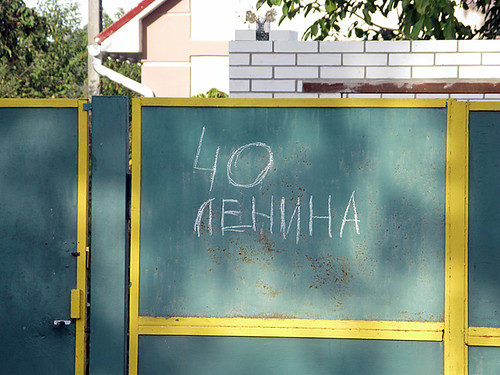



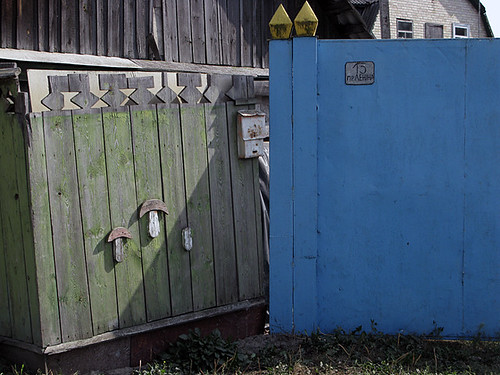

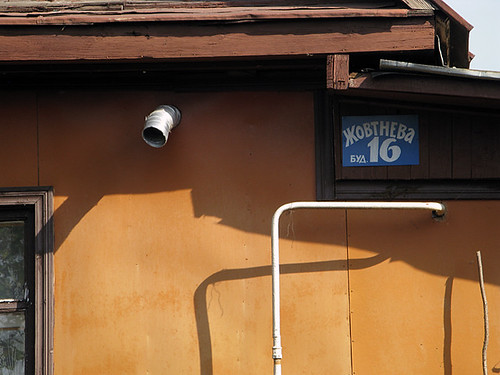
[...] For even the wild Tatars respected the nuns and stepped out of their way with reverence, calling them "the girls of the wondrous [gâvur] Prophet who died on the cross." [...]
Customers help stamp out Turkey's sex slaves
By Meriel Beattie in Ankara
December 28, 2005
The Independent
An unlikely hero has emerged in Turkey to rescue victims of forced prostitution: the brothel customer.
While the country's security forces are hardly renowned for their attention to human rights or sympathetic treatment of women, they have been chalking up impressive successes in finding and freeing trafficked women from brothels.
In the past six months, 100 women - mostly from Ukraine, Moldova, Romania or Russia - have been rescued from sex slavery and Turkish police have broken up 10 trafficking networks.
There are two reasons for these results. A charge-free hotline was set up in May by the UN's International Organisation for Migration (IOM) for women to call for help. It is staffed by multi-lingual operators who try to pinpoint where the women are - and then send in the police.
But the second, more unexpected, factor is the chivalry of the Turkish brothel client. Since the hotline started, 74 per cent of tip-offs have come from men: customers who have learned to spot the difference between a professional prostitute, and someone who's been forced into it. [...]



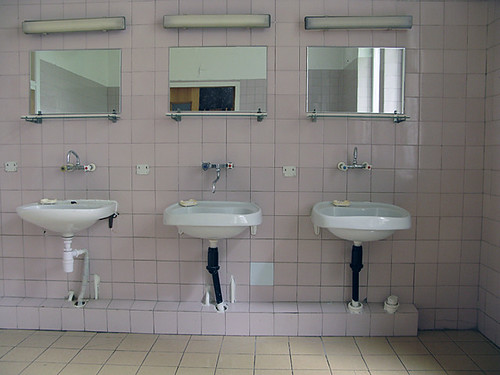
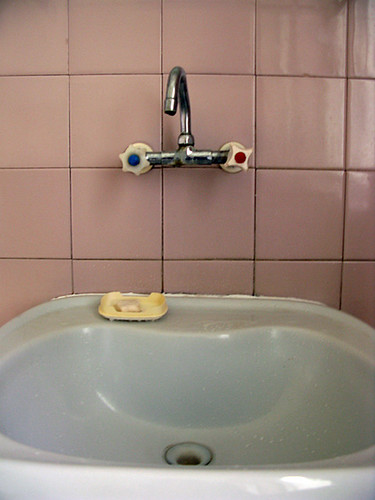


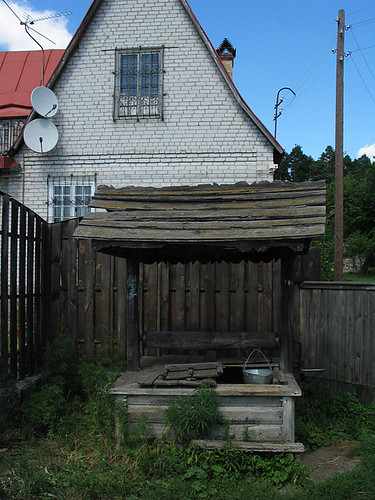

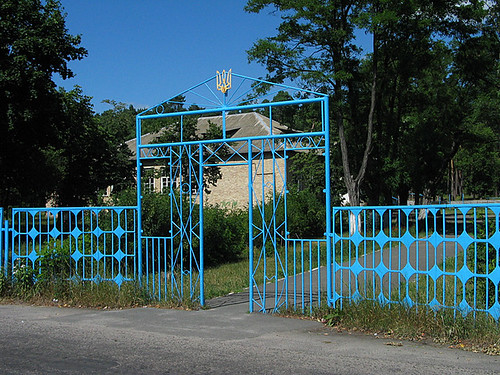

You should love the book - it's a source of knowledge.
***
Only those nations that have their own national schools can be strong in spirit. - Kyrylo Stetsenko
***
Study, and read, and learn from foreigners, and do not disdain your own. - Taras Shevchenko